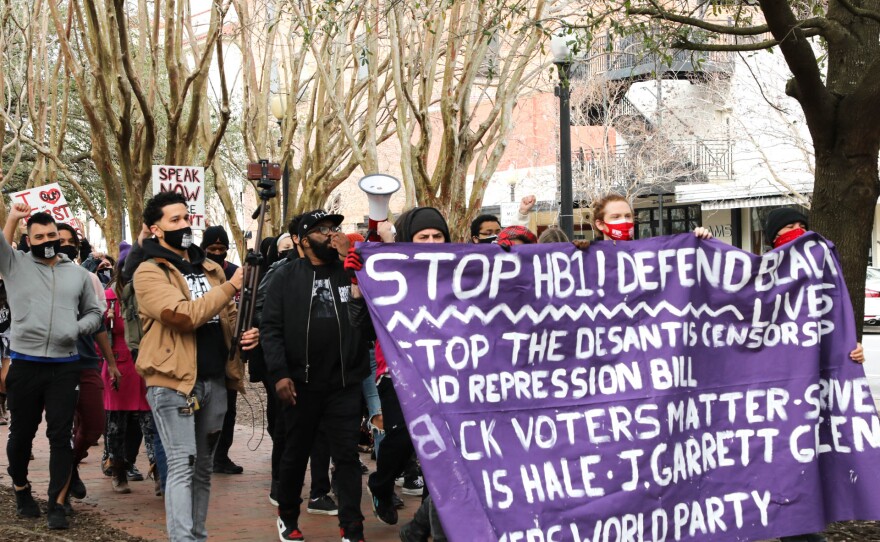Standing next to the bust of Martin Luther King Jr., local activist and organizer Jamil Davis warned a crowd of protestors that the proposed “anti-riot” state bill would affect gatherings such as the one he planned for Saturday afternoon.
“This bill is an infringement on our first amendment right,” he said. “This bill causes for black and brown organizers to have to rethink and possibly fear coming here to do these demonstrations.”
“But today, this bill is not a law.”
Walking two by two through South Palafox down to Plaza Ferdinand, Davis and about 100 others chanted such phrases as “Black Lives Matter” and “DeSantis has got to go.” There were some confused faces from diners sitting outside, but there were also a few raised fists and honking horns praising the demonstration.
“It is our duty to fight for our freedom,” Davis shouted before the march. “We have nothing to lose but our chains.”

The bill, more specifically House Bill 1, was announced by Gov. Ron DeSantis in September after months of Black Lives Matter protests in the state and the country. While most protests throughout Florida, including the 11-day protest at Pensacola’s Graffiti Bridge, were largely without incident, the bill is aimed at combating rioting, looting and violence. It gives new criminal offenses to anyone involved in a protest that results in property damage or injuries to others.
After the deadly insurrection at the Capitol on Jan. 6, the bill has gained steam. But certain language in the bill is clearly written about the Black Lives Matter movement, such as the “no ‘defund the police’ permitted measure” which prohibits state grants or aid to any local government that cuts law enforcement budgets or the “prohibition of destroying or toppling monuments” with the penalty being up to 15 years in jail.
Davis has been an outspoken opposer to House Bill 1 and has brought his concerns to state Rep. Alex Andrade. Andrade has shared his support for the bill on his Facebook page and said it’s a stand against violence incited by any group “regardless of the banner they carry.” But activists say the bill suppresses more than it protects.
“We don’t need this passed here in Florida,” said Carollyn Taylor. “(With this bill) The march on Selma wouldn’t happen, a lot of civil rights movements wouldn’t happen. It’s very vague. And it doesn’t really help the issues it’s trying to help. It’s masking other things.”
Taylor also worries this law could be misapplied and target minorities. She pointed out the difference between how U.S. Capitol rioters on Jan. 6 and Black Lives Matter protestors were treated.
“At the Capitol there was a lot less bloodshed if had been a bunch of minorities or Black people,” she said.
Mallory Luana was part of the protest at the Graffiti Bridge last summer. If HB1 were law then, she said it wouldn’t affect her standing alongside demonstrators. But she didn’t mince words when it came to be possibly arrested.

“I would kill myself before I got to the jail cell because I’d rather die at the hands of myself than die at the hands of the police state a.k.a modern slavery,” she said.
As a Black woman, she said she’s fears the safety for other Black people as they protest “against the very chains that keep us down and drowning.”
Having the right to protest is “everything,” said Devin Cole, president of Strive, a local trans advocacy organization. And it should be up to everyone to protect it, they said.
“When movements are Black-led, they are violently suppressed and so it’s up to us to continue fighting that suppression until we beat it back permanently, otherwise we’re not going to win and we need to win,” they said. “As many white people that can show up need to show up. We have to be arm-in-arm.”







